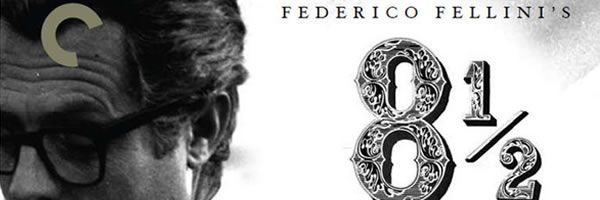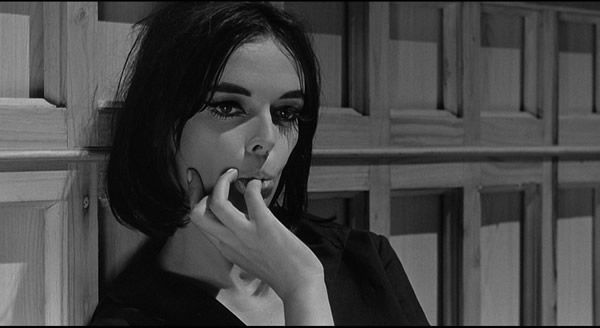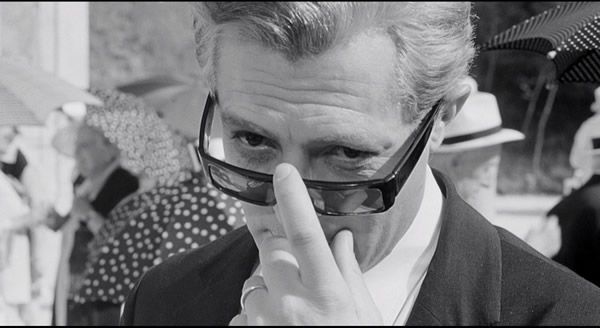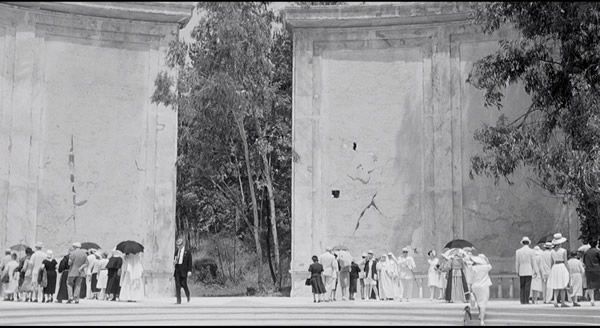Fredrico Fellini's 8 1/2 is one of his masterpieces. The man directed a couple, though like the classic line about Woody Allen, I'm drawn more to his earlier films than his later efforts. 8 ½ is the story of director Guido Anselmi (Marcello Mastroianni), and his next film, which is already in advanced pre-production. Not feeling great, he is at a spa trying to figure out this effort or perhaps avoid it. But even there he is circled by the women in his life, including his wife (Anouk Aimee), his mistress (Sandra Milo), his mother and his dream girl (Claudia Cardinale), among others. Just as he eyes women, he is hounded by the people trying to work with him, coming to him incessantly about casting and the script. My review of Criterion's Blu-ray of Fellini's 8 ½ after the jump.
Fellini's film has been dissected and revered long before I ever gave it a look, and so my first viewings have been more dutiful than out of love. The Fellini film that hooked me was La Dolce Vita, but the further I went into the man's career, the more I ran across films like Roma or Satyricon, which I never warmed up to that much. Whereas early efforts - like I vitteloni - have always been pleasureable. And so I came at this film again hoping to find the masterpiece I've always heard it was. My biggest problem has always been how nakedly autobiographical it is, to the point of distraction.
This time, I was not as preoccupied by that, and tried to accept Guido as a truth, not just as a Fellini surrogate. And Fellini's musing on the role of women in his life, his hunger for - but also his obsession with - his first sexual experience, the constant intrusions from outsiders wanting things from him, all those elements hit home on a level that meant more to me now that I understand more about the filmmaking process. It was no longer just his truth. And in that way, 8 ½, besides being a great film in its own right, is one of the great films of the DVD era. It functions as the ultimate treatise on directing, as most directors will tell you.
That's not to say those who saw it as a masterpiece before needed that perspective, but I came at it from a young cineaste's perspective. Having been regaled with the film as one of the great films of all time, it took me a while to come to the truth of that because it took a while to make the film my own. Partly because it's not really a film meant for a certain age bracket. One needs a little more reflection than I could muster at 18. But also, it's hard to remove certain films held in such esteem from the amber of greatness. It can seem like homework, even something as sexual and personal as this. But this also opens me to the possibility I must reconsidered late Fellini. Though his love of grotesques seemed to amp up, perhaps I was not ready for them. Strangely, there is nothing more exciting than the thought of reconsidering a master.
The main thing I took from this Blu-ray version was how gorgeously shot this black and white movie is. Fellini knew how to compose, and this presentation is easily the best the film has seen on home video. As such, I was able to fall into the imagery a little stronger, connect more with it. But the opening of the film is one of the great dream sequences in cinema, and there are number of immaculate dream moments like that - much like the role of Claudia Cardinale - that suggests the film as waking dream. But that is the definition of cinema, and only enhances one of the great films about filmmaking.
Criterion's Blu-ray presents the film in widescreen (1.85:1) and in original 1.0 mono. The commentary is an audio essay read by Tanya Zaicon, and interviews with documentarian Gideon Bachmann and Film professor Antonio Monda, as was on the previous two-disc DVD release. There's an introduction by Terry Gilliam (8 min.), and the self-portrait "Fellini: A Director's Notebook" (52 min.), where Fellini walks through his process, his films up to that point (1969), and shows some behind the scenes footage from his films, along with moments where he talks about abandoned works. This comes with a letter from Fellini outline his design for the piece. "The Last Sequence" (50 min.) talks about the film's rocket ship set, and the original abandoned ending. "Nina Rota: Between Cinema and Concert" (47 min.) profiles the film's composer, and there's interviews with star Sandra Milo (27 min.), assistant director and future director Lina Wertmuller (17 min.) and fan/cinematographer Vittorio Storaro (17 min.) The film's trailer and two still galleries round out the collection, and this is a great way to dig into the movie. As with most Criterion supplements, there's a treasure trove of information, but also appreciation here from different angles, and everything here is meant to enhance the experience of the film. This is 2010's first must-have on Blu-ray.





